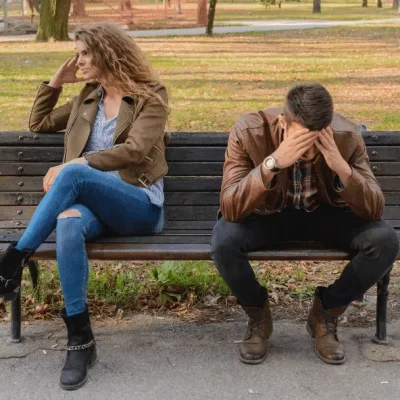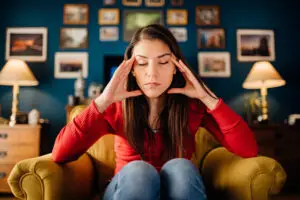“In any given moment, we have two options: To step forward into growth, or to step back into safety. Growth must be chosen again and again; fear must be overcome again and again.” – Abraham Maslow
We all experience times when we feel stressed, worried, anxious, or nervous. We worry about family responsibilities, finances, health, work, and other obligations. As we discussed in our previous post, there are a variety of holistic options for anxiety relief. However, we must first identify the source of our anxieties and its severity in order to take steps in correcting it. Recognizing the root cause is the first step toward positive change and healthier ways of managing stress and anxiety.
Types of Anxiety
The most common types of anxiety are generalized anxiety disorder (GAD), social anxiety, specific phobias, and panic disorder. Anxiety is also present in other conditions like obsessive-compulsive disorder (OCD), and post-traumatic stress disorder (PTSD).
Symptoms of more than one type of anxiety are commonly experienced. It’s vital to seek support as early as possible before anxiety begins to take over your life. Talking to a trained professional can provide resources and tools to cope.
Anxiety overload may show itself in the form of irritability, anger, inability to concentrate, stomach problems, panic attacks, muscle tension, diarrhea, nausea and vomiting, dry mouth, and sleep disturbances.
Start by asking yourself these questions:
- Is anxiety and worry affecting my quality of life?
- Is the dread and fear I’m experiencing robbing me of joyful moments?
- Am I feeling stuck with the belief that drugs are my only option, or that I have no other option than to live this way?
Everyone has a tipping point with various triggers that bring about anxiety. Taking inventory of ourselves and having self-awareness gives better opportunity to manage stress and anxiety. Be mindful of your day to day habits. Keeping a log or journal at times you’re feeling worried or anxious can help sort out your thoughts, allowing you to take more control over the situation. Understanding the trigger, or root cause of your anxiety will better equip you in being able to manage it.
Remaining in a perpetual state of anxiety is detrimental to physical and emotional wellness. Finding a professional trained in holistic treatment methods can provide safe, effective options for managing anxiety.
Treatments and Tools to Cope
Whether you suffer from a mild anxiety or more chronic form, you may be inclined to think the only option is anxiety medication. Prescribed medication may be necessary for a period of time for some people. However, clinical studies have shown various herbal remedies and botanicals to significantly decrease anxiety. Lavender oil is even being used to calm patients in hospice care.
According to a study published in Phytotherapy Research, Echinacea extract showed significant relief of anxiety in only three days. While this isn’t considered a cure all, it may provide natural relief, without the side effects of prescription drugs. And, it is always recommended to talk with your doctor when making any changes to your wellness routine.
See our previous post for more natural, holistic options for coping with anxiety. Exercise, eating well, and getting plenty of rest are essential tools to managing anxiety and overall wellness. If you are interested in more natural treatment for stress or anxiety, contact us today for a free 15-minute consultation!
About Makin Wellness
Founded in 2017 , Makin Wellness is Pittsburgh’s premier therapy & coaching centers located in Downtown Pittsburgh and Downtown New Kensington. The company’s mission is to help people heal and become happy again. Makin Wellness specializes in depression, anxiety, addiction, trauma, medical marijuana assisted treatment and relationship counseling.

B.A., CHN








